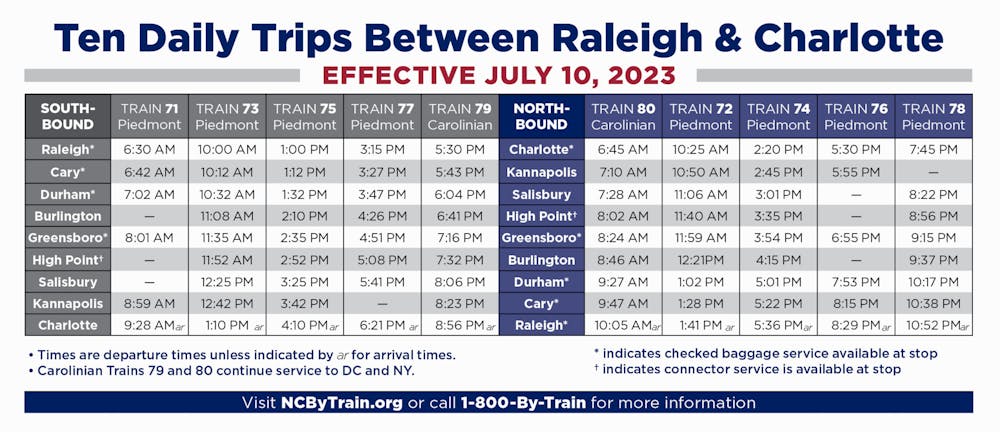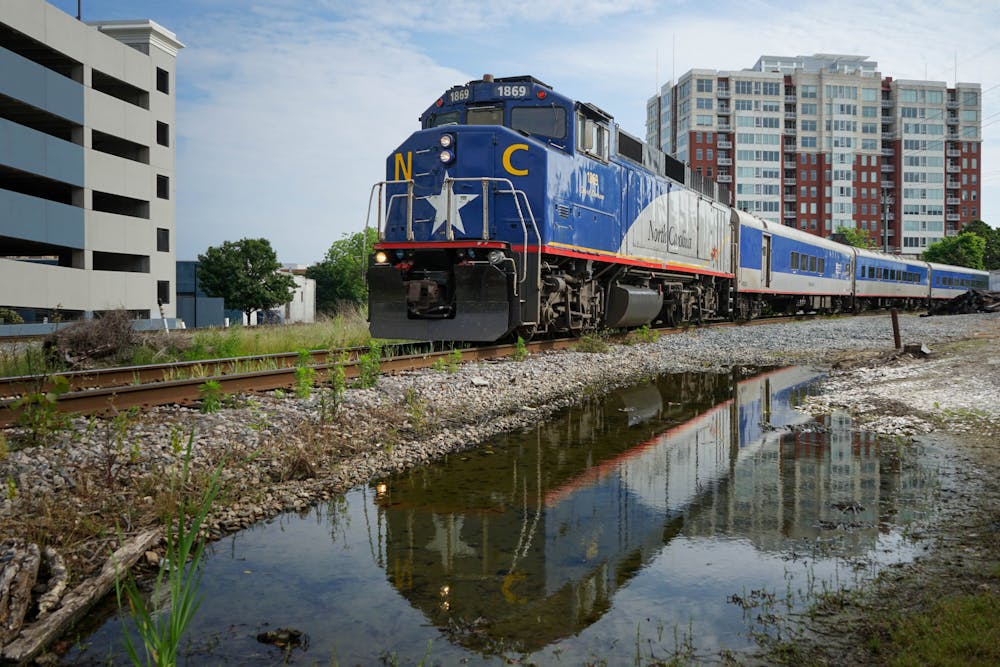Elon University professor Ryan Johnson makes his way to work on Train 71 Piedmont from Durham at 7:02 a.m. every Monday, Wednesday and Friday. He arrives at the Burlington train station at 7:40 a.m. and then bikes the remaining four miles to Elon’s campus where he teaches classes all day.
Through talking to a Burlington train station agent, Johnson learned the train he has been taking to work for the past five years will no longer stop at Burlington on the early morning route as well as two other stops, High Point and Salisbury — as of July 10.
“I understand making things express,” Johnson said. “But when they take routes that already exist that people depend upon for commuting, and then just remove them in order to save four minutes per station — they save four minutes — it struck me as really devastating. And now I may be forced to buy a car.”
Under the new train schedule, a stop at the Burlington station will not be included on Train 71 and Train 76, which are two out of 10 of the routes. Under the current train schedule, the first train from Raleigh arrives at Burlington Station before 8 a.m. Starting July 10, the first opportunity for commuters to get off at Burlington Station will be after 11 a.m.

Town of Elon Mayor Emily Sharpe said she believes this new schedule is “a real missed opportunity” for the Department of Transportation to support commuters and improve the North Carolina rail system.
“When we're taking away the ability for decent amounts of commuters to access work or play via train, I think that's just a real disservice,” Sharpe said.
The new schedule will include 10 daily routes from Raleigh to Charlotte every day in three hours, according to a North Carolina Department of Transportation press release.
Johnson said he regularly buys a 10 one-way trip ride pass between Durham and Burlington for $68. He said using this mode of transportation to commute to work is “very cheap compared to driving” and believes without this option, equity, sustainability and access are at risk for the Elon and Burlington communities.
“As someone who’s loved the train, supports the train and wants to increase access to the train for all North Carolinians —it really shocked me,” Johnson said.
John Stehlin, a professor at University of North Carolina, Greensboro, rides the train to work during the academic year. He researches the urban political economy as it relates to transportation and said the new train schedule is an issue of “regional equity.” Burlington and Salisbury are the lowest income communities in the train route, according to U.S. Census data.
“So you're cutting off that access, and the only real train that somebody could take for a traditional nine to five employment,” Stehlin said.
Beyond this concern, Stehlin believes increasing the frequency of trains would help the environment.
“It stitches these regions together in such a fundamental way and makes it possible for people to commute between these places without adding cars to the highway, without adding carbon emissions, without adding other pollution from driving,” Stehlin said.
Sharpe said her office reached out to Amtrak and other local officials but has not received much response. Though Sharpe is disappointed, she said she understands if low ridership from the Burlington station was a factor.
“Maybe they see that there's only a certain amount of people, and to them, it's not worth it for that amount of people,” Sharpe said. “I think that's unfortunate. I certainly understand if that is part of it. But it would have been nice for there to be more of an opportunity for discussion around it, rather than a decision being made without all of the key players involved.”
Liz Macam, communications officer for NCDOT’s Rail and Integrated Mobility Divisions, said she has spoken to several people from Elon University about the changes.
“We understand that some of the changes to some of the Piedmont schedules will have a negative impact on specific riders,” Macam said. “But overall, there were a variety of competing priorities and priorities and items that had to be taken into consideration.”
This is the first time the North Carolina Department of Transportation will be changing the train schedule in five years. According to Macam, the decision to change the schedule was made based on ridership data and trends by the North Carolina Department of Transportation board.
Macam declined to comment on whether the NCDOT is saving money by making fewer stops on certain routes.
According to NCDOT, more than 500,000 people used the NC By Train service last year, which is higher ridership than the company has seen in over 30 years. NC By Train is the train service that is operated by the NCDOT and its trains are staffed by Amtrak workers.
Johnson, Sharpe and Stehlin said they hope the NCDOT will consider not removing the stops at Burlington station.
Macam declined to comment on whether the board would consider adding the Burlington train station back into the two routes it's missing from.
“What I would like to see is more accessibility, even more service, a more frequent train,” Stehlin said. “Once you start having a train every hour because so many people want to use it, then maybe you start to have a couple of express trains, right? But I don't think we're there yet. And I don't know if kind of randomly excluding certain stops is the best way to grow the ridership that would get us there.”


